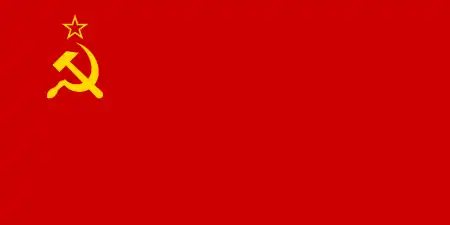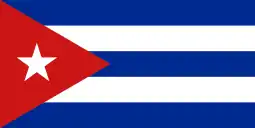Moscow 1935 was the second international chess tournament held in Moscow, taking place from 15 February to 15 March 1935.[1] Salo Flohr and future world champion Mikhail Botvinnik tied for first, followed by former world champions Emanuel Lasker and José Raúl Capablanca.
Tournament field
The single round-robin tournament was organized along the lines of Moscow 1925, with twelve Soviet players and eight international players.[2] Of the twelve Soviets, only four, Grigory Levenfish, Peter Romanovsky, Ilya Rabinovich and Fedir Bohatyrchuk had played at the 1925 event.[2]
Salo Flohr (Czechoslovakia) was internationally renowned and considered a world championship contender. Later, Flohr would be in the inaugural group to receive the grandmaster title when it was introduced by FIDE in 1950.[3] Mikhail Botvinnik (Soviet Union) was known as a rising star at age 24 and two years earlier had drawn a match with Flohr.[4] He would later become world champion in 1948. Botvinnik and Flohr (together with Levenfish) jumped out to an early lead in the tournament. After round 15, Flohr led Botvinnik by half a point. Botvinnik won in round 16 while Flohr only drew to bring the two into a first-place tie, the tournament's ultimate result as both players drew all their games in the final three rounds. Botvinnik had scored only 50% in his final nine games.[4]
Emanuel Lasker (Germany) and José Raúl Capablanca (Cuba) were former world champions. At age 66, Lasker was undefeated, beating Capablanca in their individual game and finishing third, a half point ahead of Capablanca in fourth place.[2] Reuben Fine hailed Lasker's result at age 66 as "a biological miracle."[5] Rudolph Spielmann (Austria), finished fifth.[2]
Crosstable
# Player 1 2 3 4 5 6 7 8 9 10 11 12 13 14 15 16 17 18 19 20 Total 1  Salo Flohr (Czechoslovakia)
Salo Flohr (Czechoslovakia)— ½ ½ ½ ½ ½ ½ ½ ½ 1 1 ½ ½ 1 1 1 1 1 ½ ½ 13 2  Mikhail Botvinnik (Soviet Union)
Mikhail Botvinnik (Soviet Union)½ — ½ ½ 1 0 1 ½ 1 1 ½ 1 ½ 1 ½ 0 1 ½ 1 1 13 3  Emanuel Lasker (Germany)
Emanuel Lasker (Germany)½ ½ — 1 ½ 1 ½ ½ ½ ½ ½ ½ ½ 1 ½ ½ ½ 1 1 1 12½ 4  José Raúl Capablanca (Cuba)
José Raúl Capablanca (Cuba)½ ½ 0 — ½ 1 1 ½ 1 ½ ½ 0 1 ½ 1 ½ ½ ½ 1 1 12 5  Rudolf Spielmann (Austria)
Rudolf Spielmann (Austria)½ 0 ½ ½ — ½ ½ ½ 0 1 0 ½ 1 ½ ½ ½ 1 1 1 1 11 6  Ilya Kan (Soviet Union)
Ilya Kan (Soviet Union)½ 1 0 0 ½ — ½ 0 1 0 1 1 ½ ½ 0 1 1 ½ ½ 1 10½ 7  Grigory Levenfish (Soviet Union)
Grigory Levenfish (Soviet Union)½ 0 ½ 0 ½ ½ — ½ ½ ½ 0 1 1 ½ 1 1 1 ½ 0 1 10½ 8 .svg.png.webp) Andor Lilienthal (Hungary)
Andor Lilienthal (Hungary)½ ½ ½ ½ ½ 1 ½ — 0 ½ 0 1 ½ ½ ½ ½ 0 1 1 ½ 10 9  Viacheslav Ragozin (Soviet Union)
Viacheslav Ragozin (Soviet Union)½ 0 ½ 0 1 0 ½ 1 — 0 ½ 1 0 ½ ½ ½ 1 1 ½ 1 10 10  Peter Romanovsky (Soviet Union)
Peter Romanovsky (Soviet Union)0 0 ½ ½ 0 1 ½ ½ 1 — 1 0 ½ ½ ½ ½ 1 0 1 1 10 11  Ilya Rabinovich (Soviet Union)
Ilya Rabinovich (Soviet Union)0 ½ ½ ½ 1 0 1 1 ½ 0 — 0 1 ½ 0 ½ 0 ½ 1 1 9½ 12  Nikolai Riumin (Soviet Union)
Nikolai Riumin (Soviet Union)½ 0 ½ 1 ½ 0 0 0 0 1 1 — 0 ½ 0 1 1 1 ½ 1 9½ 13  Vladimir Alatortsev (Soviet Union)
Vladimir Alatortsev (Soviet Union)½ ½ ½ 0 0 ½ 0 ½ 1 ½ 0 1 — 0 1 ½ ½ ½ 1 1 9½ 14  Victor Goglidze (Soviet Union)
Victor Goglidze (Soviet Union)0 0 0 ½ ½ ½ ½ ½ ½ ½ ½ ½ 1 — ½ ½ 0 1 1 1 9½ 15  Georgy Lisitsin (Soviet Union)
Georgy Lisitsin (Soviet Union)0 ½ ½ 0 ½ 1 0 ½ ½ ½ 1 1 0 ½ — 0 ½ ½ ½ 1 9 16  Fedor Bohatirchuk (Soviet Union)
Fedor Bohatirchuk (Soviet Union)0 1 ½ ½ ½ 0 0 ½ ½ ½ ½ 0 ½ ½ 1 — ½ ½ 0 ½ 8 17  Gideon Ståhlberg (Sweden)
Gideon Ståhlberg (Sweden)0 0 ½ ½ 0 0 0 1 0 0 1 0 ½ 1 ½ ½ — ½ 1 1 8 18 .svg.png.webp) Vasja Pirc (Yugoslavia)
Vasja Pirc (Yugoslavia)0 ½ 0 ½ 0 ½ ½ 0 0 1 ½ 0 ½ 0 ½ ½ ½ — 1 1 7½ 19  Vitaly Chekhover (Soviet Union)
Vitaly Chekhover (Soviet Union)½ 0 0 0 0 ½ 1 0 ½ 0 0 ½ 0 0 ½ 1 0 0 — 1 5½ 20  Vera Menchik (England)
Vera Menchik (England)½ 0 0 0 0 0 0 ½ 0 0 0 0 0 0 0 ½ 0 0 0 — 1½
Notes
- ↑ "Moscow (1935)".
- 1 2 3 4 Golombek 1977, p. 206
- ↑ Hooper & Whyld 1992, pp. 141–142
- 1 2 Pachman 1972, p. 100
- ↑ Fine 1976, p. 51
References
- Fine, Reuben, ed. (1976), The World's Great Chess Games, Dover, ISBN 0-486-24512-8
- Golombek, Harry, ed. (1977), Golombek's Encyclopedia of Chess, Crown Publishing, ISBN 0-517-53146-1
- Hooper, David; Whyld, Kenneth (1992), The Oxford Companion to Chess (2 ed.), Oxford University Press, ISBN 0-19-280049-3
- Pachman, Ludĕk (1972) [English trans. 1975, Dover ed. 1987], Decisive Games in Chess History, Dover, ISBN 0-486-25323-6